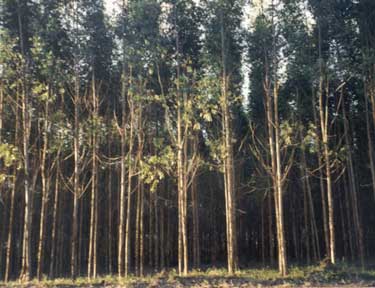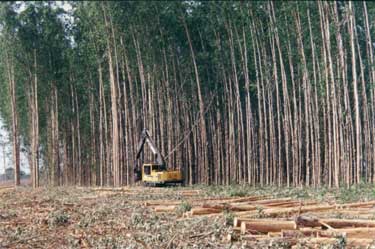Tiempo Climate Cyberlibrary
Plantations Are Not Forests
 |
Ricardo Carrere documents the negative social
and environmental impacts of the increased planting
of monoculture tree plantations and denounces the
mistaken rationale behind this activity.
|
|
The author is International Coordinator of the
World Rainforest Movement. He is co-author (with
Larry Lohmann) of "Pulping the South: Industrial
tree plantations and the world paper
economy."
|
Monoculture tree plantations continue spreading
throughout the tropics and sub-tropics. The ones we are
chiefly concerned about are characterized by being
large-scale (tens or hundreds of thousands and even
millions of hectares), planted as monocultures and composed
of fast-growing species, such as eucalyptus, acacias,
gmelinas and pines, some of which are now being cloned for
even faster growth.
Field trials are already under way in a number of
countries with genetically-modified trees aimed at
producing higher yields of a more uniform type of wood to
serve the pulp and paper industry's economic
interest.
Vast areas of land are already covered by fast-growing
tree plantations in Africa, Asia, Latin America, Oceania
and even in some European countries (Spain and Portugal)
and the southern United States. The Mekong Region countries
are no exception. Large-scale plantations were first
developed in Thailand, but later spread to Vietnam and are
now spreading in Cambodia, Lao PDR and Burma.
|
Defining plantations
For mainstream foresters, tree
plantations are almost synonymous with forests. The
Food and Agriculture Organization's year 2000
definition states that "forest includes natural
forests and forest plantations." Most foresters
go even further and divide forests into two
categories: natural forests and planted forests,
which is even worse. Although this implies agreeing
that forests and plantations have differences, it
also implies that they are essentially the same -
both are 'forests'.
This apparently simple issue has
important implications because it is used as a means
of promoting large-scale monocultures, through what
the forestry establishment defines as
'reforestation' and 'afforestation'
activities which would increase 'forest
cover', thus countering deforestation.
However, local people are much wiser
that the Food and Agriculture Organization and
mainstream foresters, because they have suffered the
impacts of these so-called planted forests. For them
the issue is much more simple - plantations are not
forests.
|
The obvious question is: what is the reason for so many
plantations, composed of the same species, being
implemented in so many countries?
The official and corporate answers to that question is
usually to present them as a solution to counter
deforestation. In all cases they are portrayed as
"planted forests" or "forest
plantations" that will increase "forest
cover," thereby having, so they say, an
environmentally positive impact. At the same time, official
and corporate publicity stress plantations' capacity to
generate employment and wealth at the local level.
None of the above answers are true. Plantations are not
forests. On the contrary, they result in negative impacts
on soils, water, plants and wildlife. Having none of the
positive environmental effects that forests have,
plantations can in no way be considered as part of any
country's 'forest cover'. Even more, they
should be considered as the final blow to the forests they
substitute, because they eliminate the possibility of any
natural forest regeneration.
|

|
Espirito Santo,
Brazil
© Ricardo Carrere
|
|
Defining plantations...
In many places, monoculture tree
plantations are defined as 'deserts'. Green
deserts, deserts of trees and socioeconomic deserts.
Such is the case of Brazil, where a broad group of
people and organizations campaigning against
eucalyptus plantations have created a network called
"Movement Alert Against the Green
Desert."
The word 'desert' implies a
lifeless environment and this is precisely what these
plantations are. They provide no food to the local
fauna, no space for the local flora and no goods or
services to the local people.
In a recent visit to a plantation
area in Colombia, local peasants took me to a pine
plantation and before getting there they told me:
"Now you will know what silence means." And
they were of course right. Not a single sound was to
be heard. It was, in fact, a lifeless and silent
desert.
However, defining plantations as
'green deserts' has been rightly challenged
by a person in South Africa, a country having large
desert areas. This woman reacted by saying that
"green wastelands" would be more apt than a
comparison with deserts, because "there is more
biodiversity in a few square metres of the Namib
desert than in an entire plantation."
But regardless of whether it is or is
not correct to call them deserts, the following
description of plantations made by a South African
local landowner is enlightening: "billions of
rows of thirsty pine, gum (eucalyptus) and wattle
(acacia) masquerading as 'forests' which cast
a sterile blanket over huge areas... to produce pulp,
planks and poles for the profit of
shareholders."
|
Regarding people, large-scale tree plantations result in
net employment losses at the local level. The few and low
quality jobs they create in no way compensate for the
employment and livelihood means they destroy. Large
expanses of forest and agricultural land which provide for
the subsistence needs of local communities are taken over
by plantation companies, resulting in the impoverishment of
local communities. The promised wealth never materializes -
except in distant cities where company shareholders pocket
the resulting profits.
The true reasons for the promotion of these plantations
are directly linked to a set of Northern-based interests,
ranging from the pulp and paper industry to the
appropriation of the atmosphere by Northern polluters.
The powerful pulp and paper industry is at the forefront
of the plantation invasion in the South. Its aim is to
ensure supply of cheap raw material to allow it to expand
its ever increasing paper sales. While using the argument
that people need more paper, the industry hides the fact
that most of the paper produced is disproportionate to real
needs and its consumption is concentrated in the affluent
North.
While the average per capita paper consumption in
the United States is estimated at 330 kilograms per year,
the figure drops to 40 kilograms in Brazil, 38 in South
Africa (both large producers and exporters of pulp) and 30
in Thailand. It is clear that it is the industry's and
not the peoples' need for pulpwood which is behind the
promotion of vast plantations of fast-growing trees in the
South.
|
Defining plantations...
In the Malaysian state of Sarawak,
local people have for years been opposing logging
concessions in their territories and have suffered
the social and environmental impacts resulting from
deforestation and forest degradation.
I was, therefore, surprised when a
person from Sarawak described eucalyptus and oil palm
plantations as being "worse than logging."
His explanation couldn't have been clearer. The
person said: "logging companies come to our
territories, cut the largest trees, take the logs out
of the forest and leave. Plantation companies are
worse. They come to our territories, cut the best
trees, set the rest on fire, plant their own trees
and stay!"
|
Travelling in the same boat are a numerous set of other
interests, such as machinery suppliers, consultancy firms,
export-credit agencies, private and multilateral banks, as
well as local elites, forestry departments, research
institutions and others.
A new set of actors has more recently also become
involved in the spread of plantations as a result of a
decision by the United Nations Framework Convention on
Climate Change that accepted tree plantations as
'carbon sinks'. This needs some explanation.
The North has for years been adding carbon dioxide to
the atmosphere through the emissions of its massive use of
fossil fuels, creating global climate change. The only
sensible solution is to drastically reduce these emissions
by changing to non-fossil fuel energy sources such as solar
or wind energies, but powerful economic interests, led by
the oil and gas industry, oppose such a move. Instead, they
put forward the idea of tree 'carbon sinks'.
Trees grow through photosynthesis, which implies that
they take carbon dioxide from the air, release the oxygen
and convert the carbon into wood. All of which is, of
course, true. However, these corporate proponents go on to
say that planting many trees will "compensate"
carbon dioxide emissions from fossil fuels, which will be
"sunk" into the growing trees. This is, of
course, untrue.
The reason for this being untrue is simple. Carbon from
fossil fuels is not part of the functioning of the
biosphere. It is safely stored under the surface of the
Earth unless humans extract it, which is what has been
happening since the Industrial Revolution. Conversely,
trees are part of the functioning of the biosphere and the
most they can do is to incorporate the carbon released to
the atmosphere by deforestation. One tonne of carbon from
fossil fuels is not equivalent to a tonne of carbon stored
in trees.
As long as fossil fuels continue being extracted from
the sub-soil, the more the carbon pool will increase above
ground and climate change will accelerate even further.
However false the solution is, the fact is that it has
been adopted and, if implemented on a large scale, will
entail more problems to local people in the South.
|

|
Bahia, Brazil
© Ricardo Carrere
|
|
Defining plantations...
South Africans have been quite
inventive in providing definitions about plantations.
The main reason being that the country has some two
million hectares of monoculture tree plantations and
almost the same area of land invaded by plantation
trees (pines, eucalyptus and acacia). In this
country, some people refer to plantations as
"green cancer," which provides a good image
of how plantations spread and destroy water, soil,
wildlife, plants and people's livelihoods,
eventually killing everything... as cancer does.
|
The second question is: why are these pulp or carbon
plantations being implemented in the South, while both the
pulp/paper industry and the major polluters are based in
the North?
The answer is that the South, particularly regions with
tropical and sub-tropical environments, have a number of
advantages. Firstly, Southern environments allow for much
faster tree growth than in the North. In countries such as
Thailand or Brazil, a tree can be harvested for pulp eight
years after having been planted, while it can take decades
in the North to reach the same size.
Secondly, land is much cheaper in the South and can be
leased or bought for substantially less than it would have
cost in the North. Thirdly, labour is also cheap and can be
made even cheaper through working conditions that would be
unthinkable and unacceptable in northern countries. Weak
law enforcement regarding the environment and working
conditions is also an asset to increased profitability. But
an even greater advantage for profitability is through the
direct and indirect subsidies which local governments are
advised to put in place for the promotion of plantations.
This advice of course invariably comes from Northern
'donors', consultants and multilateral
institutions. Another added bonus is state repression to
local peoples' opposition to plantations or pulp
mills.
The end result is the establishment of extensive
plantations throughout the South, to either serve as carbon
dumps and/or to supply the pulp and paper industry with
vast quantities of cheap and homogeneous raw material to
feed its pulp mills (increasingly built in the
environmentally and socially cheaper South) for the
consumption of paper in the North.
In spite of having governments, corporations,
'expert' bodies and mainstream 'science' on
their side, plantation promoters still face a major
obstacle. That is, local peoples and their allies. This is
where the main battle is being fought.
|
Defining plantations...
Chile is a South American country
where a democratically elected government was
overthrown by a military coup in the early 1970s. A
ruthless dictatorship ruled the country for almost
two decades. During these years the military took
over the indigenous Mapuche people's territories
in southern Chile and handed them over to plantation
companies, which covered them with vast plantations
of alien pine trees.
It is thus not surprising that I have
heard these plantations being described as
"planted soldiers" because they are green,
planted in straight rows and advancing! Local people
hate them as much as they hated the military during
the dictatorship they had to endure. That hatred
resulted in a strong discussion within the
cooperative movement because its international symbol
is composed of two pine trees and people didn't
want to have pine trees as their symbol.
|
Experience has taught local communities that these types
of plantations are a major threat to their livelihoods and
that they need to oppose them. Alliances are being built at
the local, national, regional and international levels and
a global movement against plantations has emerged in both
South and North. Its message is transparently simple -
plantations are not forests! This simple message, though,
carries within an implicit message which talks about
people's rights, forest conservation, cultural and
biological diversity, water, climate and livelihoods, all
of which are readily understood by participants in this
movement and, in particular, by the local people directly
affected by plantations.
The balance is shifting. Opposition is on the rise and
plantations are being challenged in an increasing number of
countries, ranging from Brazil to South Africa, from
Thailand to Chile, from India to Cambodia. Local people are
standing up to defend their rights and are joining the
global struggle against a plantation model which has
already proved to be socially and environmentally negative.
Large-scale monoculture tree plantations must, and can, be
stopped.
Further information
Ricardo Carrere, International Secretariat, World
Rainforest Movement, Maldonado 1858, CP 11200 Montevideo,
Uruguay. Fax: +598-2-4100985. Email: rcarrere@wrm.org.uy. Web:
www.wrm.org.uy.
On the Web
The book "Pulping the South" is available
on-line. A joint study of the threat
posed by genetically-modified trees by the World
Rainforest Movement and Friends of the Earth
International is also available (from early 2005);
WRM
Bulletin 88 contains related articles.
Acknowledgements
This comment by Ricardo Carrere was presented in the
March-June 2004 edition of Watershed
(Volume 9, No. 3. Watershed is a People's Forum on
Ecology with focus on the nations of Burma, Cambodia, Lao
PDR, Thailand and Vietnam. It is published three times a
year by the "Towards Ecological Recovery and Regional
Alliance" (TERRA). For further information regarding
Watershed and the activities of TERRA contact: TERRA, 409
Soi Rohitsuk, Ratchadapisek 14 Road, Huay Khwang, Bangkok
10320, Thailand. Fax: +66-2-6910714. Email: watershed@terraper.org.
Web: www.terraper.org.


